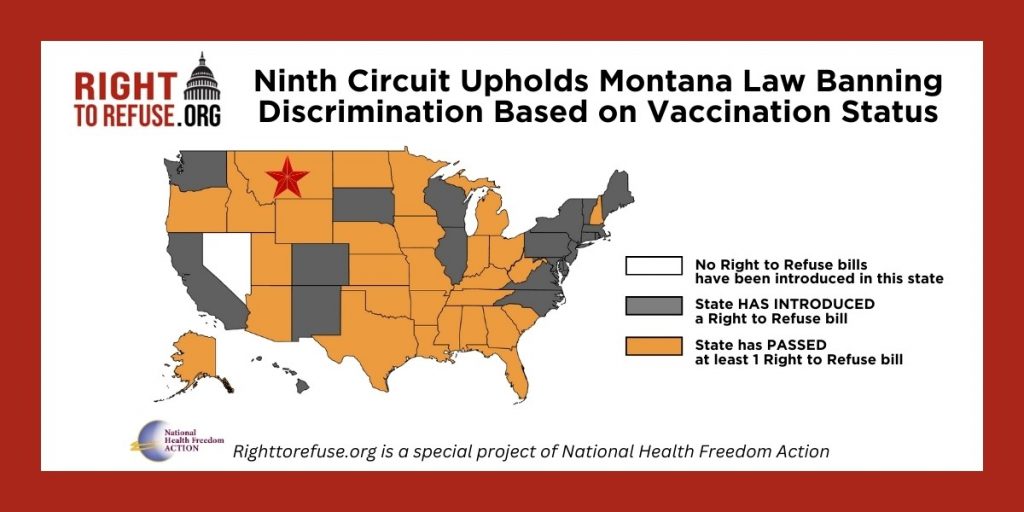
In 2024, our federal courts issued many opinions protecting health freedom. At least ten decisions have defended religious exemptions, and back in June the Ninth Circuit ruled that if, as alleged, the COVID-19 products do not prevent transmission of that virus, they may not even qualify as “vaccines.” Today we look at the recent ruling in Montana Medical Association, et. al. v. Knudsen, et. al.
Montana HB 702 banned vaccination status discrimination
In 2021, Montana passed House Bill 702, banning discrimination based on either vaccination status or possession of a vaccine “passport.” In 2022, the US District Court for Montana found that this Right to Refuse law was preempted by both the Americans with Disabilities Act and the Occupational Safety and Health Act. On October 9, the Ninth Circuit Court of Appeals overturned this trial court decision, allowing HB702 to go into effect. The lead plaintiff challenging the law is the Montana Medical Association. Along with medical providers and patients, the MMA sued both Montana’s Attorney General and the state’s Commissioner of Labor and Industry.
“Law of the Land” contradicted?
The US Constitution says that federal laws are the “supreme Law of the Land” regardless of what state laws or constitutions have to say, under article VI, clause 2. The trial court found that the ADA and the OSH Act “impliedly” preempted the anti-discrimination bill. Federal law that conflicts with state law can mean that the former preempts, or disallows, the latter. The trial judge also found that HB702 violated the Fourteenth Amendment’s Equal Protection Clause because it lacked a rational basis. So, the District trial court had ordered that the new law could not be enforced in any health care settings. The Ninth Circuit’s Judge Daniel A. Bress notes that, “HB 702 amended the Montana Human Rights Act to prohibit discrimination based on vaccination or immunity status.”
Carve-outs allow recommendation of vaccines and action by health facilities
Specifically, this bill made it “an unlawful discriminatory practice” for any person or government entity to limit access to services, educational and employment opportunities, health care services, and other access “based on the person’s vaccination status or whether the person has an immunity passport[.]” HB 702 did include “carve-outs” as noted by the appeals court. One, it said that employers could still recommend that an employee get a vaccine. Another said that a health care facility may ask employees to volunteer their vaccination status, so that the facility could determine what reasonable accommodation measures might be needed and that such a facility could assume an employee to be unvaccinated if they declined to offer proof of immunization. It also allowed these entities to implement, “reasonable accommodation measures for employees, patients, visitors, and other persons who are not vaccinated or not immune to protect the safety and health of employees, patients, visitors, and other persons from communicable diseases.” But private doctor’s offices were not included in the otherwise broad definition of a “health care facility.”
Another carve-out for the Centers for Medicare and Medicaid Services and Centers for Disease Control and Prevention
A third “carve-out” was that a “licensed nursing home, long-term care facility, or assisted living facility is exempt from compliance” with the law “during any period of time that compliance…would result in a violation of regulations or guidance issued by [Centers for Medicare and Medicaid Services (CMS) or the Centers for Disease Control and Prevention].” The plaintiffs included residents with immune system compromise who are alleged to be “qualified individuals with a disability” per the ADA. The Montana Medical Association and other plaintiffs asserted that their “ADA preemption theory is that in health care settings, the ADA requires employers to know employee vaccination status and to discriminate on the basis of this status in order to furnish ADA accommodations for persons with immunocompromising disabilities, including patients and other employees.”
Impossibility and obstacle preemption?
OSH Act preemption “is premised on the…belief that health care employers must have either vaccinated employees or knowledge of their employees’ vaccination status to satisfy their OSH Act duty to furnish a workplace free of recognized hazards.” The plaintiffs posited that HB 702 meets the standard for both “impossibility preemption,” that it is not possible to follow both the federal and the state law, and “obstacle preemption,” that HB 702 unlawfully interferes with the objectives of the US Congress. And the district court found that compliance with the ADA requires knowledge of vaccine status and the ability to discriminate on this basis as to health care workers.
Hypothetical conflict of laws not enough
Judge Bress offered that the findings made by the lower court showed, at most, “the existence of a hypothetical or potential conflict” between HB 702 and the ADA. This speculation does not justify finding that the former is preempted by the latter: “On this record, plaintiffs have not shown that a specific accommodation or modification involving knowledge of employee vaccination status or discrimination based on vaccination status would be reasonable or necessary in any or all health care settings.” He also said that the plaintiffs have not shown that the accommodations still allowed under HB 702 are inadequate.
OSH Act challenge also too speculative
As to the OSH Act, Judge Bress once again found that the trial court was in error to strike down HB 702. Quoting a prior appeals decision, he offers that, “The OSH Act requires that every employer provide a workplace that is ‘free from recognized hazards that are causing or are likely to cause death or serious physical harm to his employees’ (the ‘general duty’ clause) and ‘comply with occupational safety and health standards promulgated’ by [OSHA].” Yet there are no OSHA standards regarding vaccinations as covered by HB 702. And the court points out that while OSHA did have a large-employer COVID-19 vaccine mandate, this was struck down by the US Supreme Court in 2022.And while the trial judge had found that a “general duty” clause of the OSH Act preempts HB 702, as with the ADA claim Bress ruled that any such preemption was speculative. Notably, in this case the plaintiffs were alleging that HB 702 was preempted “on its face.” And he left open the question of whether an “as applied” challenge might have been more successful. Finally, dismissing the Equal Protection claim, Bress said that HB 702 easily meets the applicable “rational basis” test.
